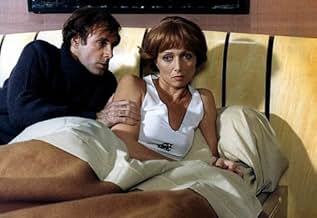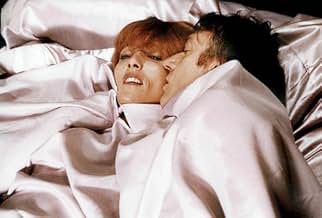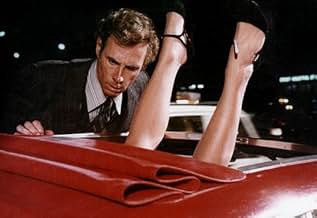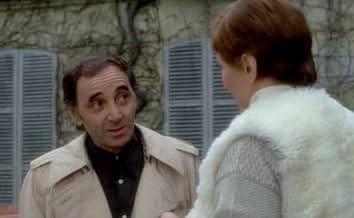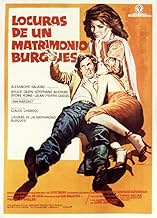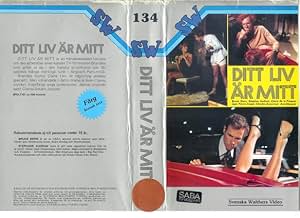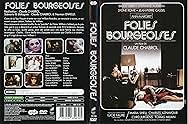Folies bourgeoises
- 1976
- Tous publics
- 1h 47min
NOTE IMDb
4,3/10
376
MA NOTE
Une femme perd la raison après avoir surpris son mari en pleine étreinte avec sa maîtresse.Une femme perd la raison après avoir surpris son mari en pleine étreinte avec sa maîtresse.Une femme perd la raison après avoir surpris son mari en pleine étreinte avec sa maîtresse.
- Réalisation
- Scénario
- Casting principal
Roland Travers
- Le premier invité
- (as R. Travers)
Jean Lanier
- Le second invité
- (as J. Lanier)
Jean-Marie Bernicat
- Bookseller
- (as J.M. Bernicat)
Avis à la une
After having looked high and low for this to be included in director Chabrol's own retrospective, which I undertook in time for his 80th (and, as it turned out, last) birthday, I finally managed to track down both a French (albeit unsubtitled) and English-language version; for this review, then, I opted to watch the battered latter print (even if it is the shorter, by one minute).
I had heard a lot of negative things about it but, while falling far short of his best efforts, the film is not quite Chabrol's nadir either – as many would have it; on the other hand, it has been likened by some to the work of Luis Bunuel (due to its fantasy/surreal elements which, however, bafflingly draw attention to themselves by being bathed in a soft glow!). Still, the overall treatment is way too farcical to have the desired satirical effect (in fact, this more readily approximates the style of a Fellini or Marco Ferreri!); ultimately, the film's main flaw is the lack of a proper plot – conversely, a definite asset emerges to be Manuel De Sica's score, which is alternately emphatic and wistful but always haunting.
I, for one, was particularly drawn to it by virtue of a star-studded cast; this factor, however, proved misleading since most are given thankless roles: worst of all in this regard were Charles Aznavour as a doctor and Curt Jurgens as a jeweler (incidentally, an uncredited Chabrol even gives himself what amounts to a walk-on part). Typically, the women are numerous and lovely: Stephane Audran (delightful as ever in her last – and most histrionic – leading role for her director husband, showing off her statuesque body despite being 43, and also seen having a romp in a Volkswagen with her legs stretching out of its top!), Sydne Rome (as her impetuous niece), Ann-Margret (as Audran's romantic rival, called Charlie Minerva, involved with both her husband and lover[!]) and Sybil Danning (as Audran's lover's secretary); the odd one out in this company is Maria Schell, who is decidedly embarrassing as a wacky maid: unaccountably developing a hankering for a male doctor, she throws herself out the window in order to be put into his care – later, when the protagonists relocate to the country and her room is destroyed by a torrential downpour, she tells her employers: "You don't need a maid but an exorcist!"
The men in the cast are no less notable: Bruce Dern (as an American poet living in Paris craving a literary prize that eventually goes to a local writer – whose wife Audran fantasizes doing a gratuitous nude scene in a theater and himself imagines having a foursome with Rome, Ann-Margret and Danning, until Audran turns up to castrate his gigantic erection!), Jean-Pierre Cassel (his third and last film with Audran, here playing her lover and Dern's publisher, following Chabrol's own much superior THE BREACH [1970] and Bunuel's masterpiece THE DISCREET CHARM OF THE BOURGEOISIE [1972]) and Tomas Milian (as a Chaplinesque detective, forever having the biscuits he is dunking melt in his coffee, whom Audran appoints to spy on her lover!).
P.S.: An interesting coincidence relating to Dern and TWIST is that, in the same year, he starred in a film by Alfred Hitchcock i.e. FAMILY PLOT (1976) and this, made by his French counterpart Chabrol (not to mention the co-author of the first-ever critical study on the Master Of Suspense's work)!
I had heard a lot of negative things about it but, while falling far short of his best efforts, the film is not quite Chabrol's nadir either – as many would have it; on the other hand, it has been likened by some to the work of Luis Bunuel (due to its fantasy/surreal elements which, however, bafflingly draw attention to themselves by being bathed in a soft glow!). Still, the overall treatment is way too farcical to have the desired satirical effect (in fact, this more readily approximates the style of a Fellini or Marco Ferreri!); ultimately, the film's main flaw is the lack of a proper plot – conversely, a definite asset emerges to be Manuel De Sica's score, which is alternately emphatic and wistful but always haunting.
I, for one, was particularly drawn to it by virtue of a star-studded cast; this factor, however, proved misleading since most are given thankless roles: worst of all in this regard were Charles Aznavour as a doctor and Curt Jurgens as a jeweler (incidentally, an uncredited Chabrol even gives himself what amounts to a walk-on part). Typically, the women are numerous and lovely: Stephane Audran (delightful as ever in her last – and most histrionic – leading role for her director husband, showing off her statuesque body despite being 43, and also seen having a romp in a Volkswagen with her legs stretching out of its top!), Sydne Rome (as her impetuous niece), Ann-Margret (as Audran's romantic rival, called Charlie Minerva, involved with both her husband and lover[!]) and Sybil Danning (as Audran's lover's secretary); the odd one out in this company is Maria Schell, who is decidedly embarrassing as a wacky maid: unaccountably developing a hankering for a male doctor, she throws herself out the window in order to be put into his care – later, when the protagonists relocate to the country and her room is destroyed by a torrential downpour, she tells her employers: "You don't need a maid but an exorcist!"
The men in the cast are no less notable: Bruce Dern (as an American poet living in Paris craving a literary prize that eventually goes to a local writer – whose wife Audran fantasizes doing a gratuitous nude scene in a theater and himself imagines having a foursome with Rome, Ann-Margret and Danning, until Audran turns up to castrate his gigantic erection!), Jean-Pierre Cassel (his third and last film with Audran, here playing her lover and Dern's publisher, following Chabrol's own much superior THE BREACH [1970] and Bunuel's masterpiece THE DISCREET CHARM OF THE BOURGEOISIE [1972]) and Tomas Milian (as a Chaplinesque detective, forever having the biscuits he is dunking melt in his coffee, whom Audran appoints to spy on her lover!).
P.S.: An interesting coincidence relating to Dern and TWIST is that, in the same year, he starred in a film by Alfred Hitchcock i.e. FAMILY PLOT (1976) and this, made by his French counterpart Chabrol (not to mention the co-author of the first-ever critical study on the Master Of Suspense's work)!
In Paris, the successful American writer William Brandels (Bruce Dern) lives with his French wife Claire Brandels De La Tour Piquet (Stéphane Audran) a loveless marriage without sex. Claire's niece Nathalie De La Tour Piquet (Sydne Rome) lives in the apartment with the couple and Gretel (Maria Schell) is their maid. Claire has a love affair with William's publisher Jacques Lavolet (Jean-Pierre Cassel). When William does not win the Zola Prize, he becomes upset and has a writer's block. When Claire meets William's Italian translator Charlie Minerva (Ann-Margret) in in the release of his new book, she learns that Jacques gave a jewel to her, and she becomes upset with him. When she witnesses William walking with Charlie and her daughter through the streets of Paris, she becomes jealous of her husband and tries to rekindle their love. Will she succeed?
"Folies bourgeoises", a.k.a. "The Twist" (1976), is an unfunny, boring and messy comedy by Claude Chabrol, who is a master of the suspense and crime, but does not work in comedies. Bruce Dern is neither handsome nor a comedian and is completely miscast in this movie. How a man with his face can attract women that are out of his league like Ann-Margret? The plot is unfunny, and it is impossible to laugh at the situations and Claire's paranoia. It is also messy, and hard to find the point of the whole story. My vote is three.
Title (Brazil): "Vidas em Jogo" ("Lives at Stake")
"Folies bourgeoises", a.k.a. "The Twist" (1976), is an unfunny, boring and messy comedy by Claude Chabrol, who is a master of the suspense and crime, but does not work in comedies. Bruce Dern is neither handsome nor a comedian and is completely miscast in this movie. How a man with his face can attract women that are out of his league like Ann-Margret? The plot is unfunny, and it is impossible to laugh at the situations and Claire's paranoia. It is also messy, and hard to find the point of the whole story. My vote is three.
Title (Brazil): "Vidas em Jogo" ("Lives at Stake")
This is one of Claude Chabrol's weaker films. It's about the same topics as usual - a French high class couple on the country side between hot love affairs, paranoia and domestic catastrophes. While Chabrol can easily make good thrillers, crime dramas and social studies with witty plots with touch of irony, bitterness and sarcasm, he's not good at directing straight comedies like that.
The plot is too confusing, the acting is really bad (especially Maria Schell as a hysterical Swiss house maid), nearly all jokes fall flat, and after a few minutes only this French comedy simply gets on your nerves. Avoid it and rather watch other Chabrol films instead like the brilliant "A Judgement In Stone", "The Butcher", "The Beast Must Die", "The Hatter's Ghost" and the nice Inspector Lavardin crime movies.
The plot is too confusing, the acting is really bad (especially Maria Schell as a hysterical Swiss house maid), nearly all jokes fall flat, and after a few minutes only this French comedy simply gets on your nerves. Avoid it and rather watch other Chabrol films instead like the brilliant "A Judgement In Stone", "The Butcher", "The Beast Must Die", "The Hatter's Ghost" and the nice Inspector Lavardin crime movies.
French-Italian-West German co-production from French director and co-writer Claude Chabrol is an alleged comedy adapted from Lucie Faure's novel "Le Malheur Fou" (translated as The Mad Misfortune). Misfortune, indeed! Story concerns the frustrated marriage of two writers in Paris, a put-upon American (a hopelessly miscast Bruce Dern) and his sex-hungry spouse (Stéphane Audran). One feels the actors must have owed Chabrol a favor, but what he does to them on-screen is beyond contempt. Ann-Margret's acclaimed turn in "Tommy" the year before surprisingly opened very few new doors for the actress--or maybe it was just her choices that were terrible. This one's as bad as they come. NO STARS from ****
That was Chabrol's seventies nadir by such a wide margin it's difficult to find which would be the second :"nada" perhaps,and nevertheless ,that film seems to tell a story,and the director seemed still to know where he was going.
It did not seem that way after "les folies bourgeoises" a disastrous collaboration between Chabrol's usual suspects (Audran,Cassel),German earnest thespian Schell (who was never as bad as here,as an user aptly points out ,as the swiss maid ) and American stars (Bruce Dern who walks across a theater completely naked :it's only a fantasy ,we are told,but Luis Bunuel,Claude Chabrol is definitely not.
After this disaster,which got unanimous thumbs down in his native country,Chabrol occasionally came up with good films ("Alice Ou la dernière fugue" "L enfer" )but he was never to recapture the magic of the 1968-1973 productions.
It did not seem that way after "les folies bourgeoises" a disastrous collaboration between Chabrol's usual suspects (Audran,Cassel),German earnest thespian Schell (who was never as bad as here,as an user aptly points out ,as the swiss maid ) and American stars (Bruce Dern who walks across a theater completely naked :it's only a fantasy ,we are told,but Luis Bunuel,Claude Chabrol is definitely not.
After this disaster,which got unanimous thumbs down in his native country,Chabrol occasionally came up with good films ("Alice Ou la dernière fugue" "L enfer" )but he was never to recapture the magic of the 1968-1973 productions.
Le saviez-vous
- AnecdotesClaude Chabrol himself often defined this title as "the worst film" of his career, stating he was fully aware at the time that the whole project was doomed from the very beginning.
Meilleurs choix
Connectez-vous pour évaluer et suivre la liste de favoris afin de recevoir des recommandations personnalisées
Détails
- Durée1 heure 47 minutes
- Mixage
Contribuer à cette page
Suggérer une modification ou ajouter du contenu manquant

Lacune principale
By what name was Folies bourgeoises (1976) officially released in India in English?
Répondre
